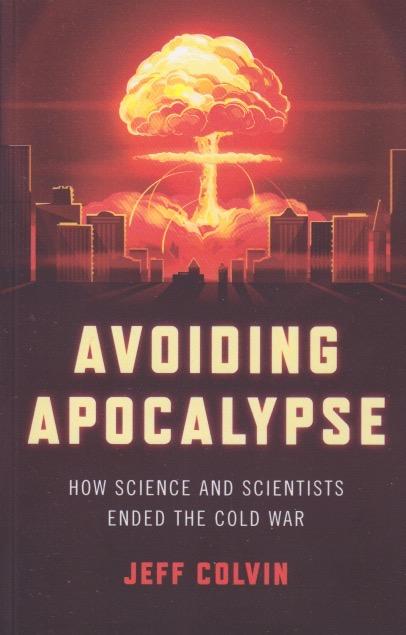
Avoiding Apocalypse, as the title suggests, is something most reasonable people would agree is a good thing. This book by Jeff Colvin, a science advisor in the George H. W. Bush administration’s Department of Energy, tells the story, in the words of the subtitle, How Science and Scientists Ended the Cold War. Long time readers of this blog will know a couple things: I only comment on politics when I’m forced to by circumstances, and I’m an eclectic reader. The latter point led me to this book and led to a bit of the former. Nuclear war terrifies me. Growing up in the seventies and eighties, when at times it seemed that we were a hair-trigger away from mutually assured destruction, I wondered why world leaders couldn’t see what all the rest of us did. There may be some answers to this in Colvin’s book.
He initially makes the point that the only way for science to thrive is to have a democratic government. (Think carefully, card-carrying Republicans, about running anti-democracy candidates!) Colvin clearly shows how in the Soviet Union, repression and state-run thought-policing hampered scientific exchange and prevented Russian development. It was only under the leadership of Mikhail Gorbachev that this connection was realized and dismantling of the Cold War was led by scientists, such as Andrei Sakharov, who was instrumental in the Soviet development of nuclear weaponry, but who was exiled for his activism in trying to prevent the apocalypse of the title. The Soviet administration had to change enough to permit scientists to speak out before reason could enter the equation.
This is a scary book. Democracy, which many of us advocate and which seems the best, even if flawed, system of government, is often captive to ideologues. Even today anti-rational people adore Trump, despite the fact, as this book shows, he brought us dangerously close to annihilation by his sheer incompetence. Tracing the history of arms control, and its great successes, leads to the little ray of optimism that shines through.
One of the problems with the publishing world is its inherent slowness. Although only published this year, this book was written in 2020. I, for one, would be interested in the author’s take on things over the last year or so. His understanding of what had been happening in Ukraine would, no doubt, shed some light on the tragedy going on there now. One thing this important book makes abundantly clear is that democracies only work when, like scientists, people vote rationally, not with some gut feeling that a self-made messiah will lead us to bankrupt salvation.
